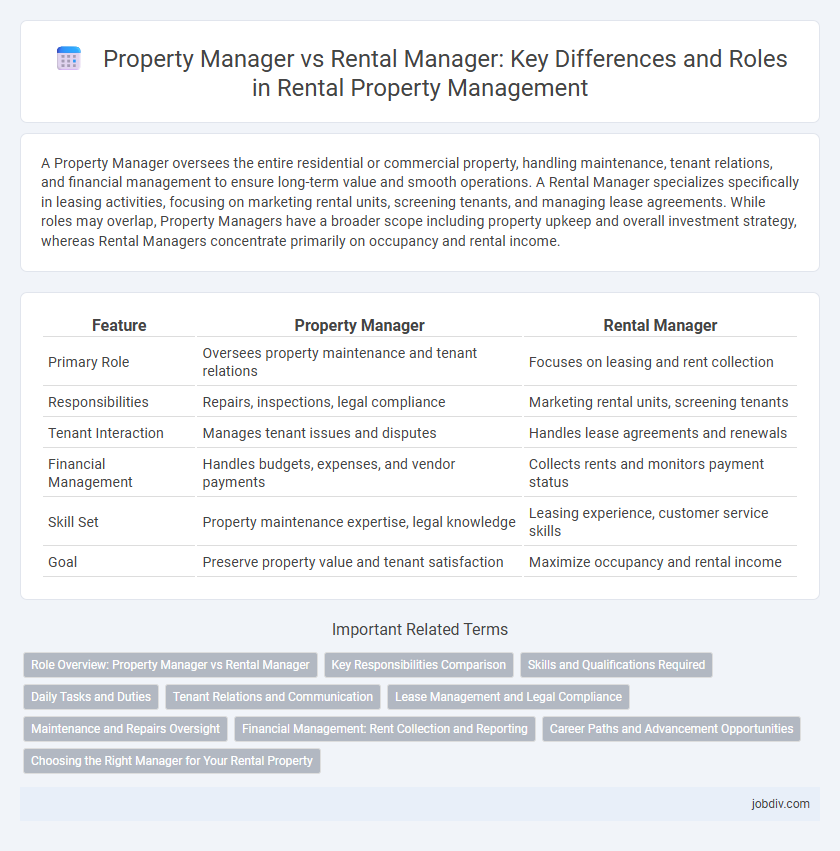A Property Manager oversees the entire residential or commercial property, handling maintenance, tenant relations, and financial management to ensure long-term value and smooth operations. A Rental Manager specializes specifically in leasing activities, focusing on marketing rental units, screening tenants, and managing lease agreements. While roles may overlap, Property Managers have a broader scope including property upkeep and overall investment strategy, whereas Rental Managers concentrate primarily on occupancy and rental income.
Table of Comparison
| Feature | Property Manager | Rental Manager |
|---|---|---|
| Primary Role | Oversees property maintenance and tenant relations | Focuses on leasing and rent collection |
| Responsibilities | Repairs, inspections, legal compliance | Marketing rental units, screening tenants |
| Tenant Interaction | Manages tenant issues and disputes | Handles lease agreements and renewals |
| Financial Management | Handles budgets, expenses, and vendor payments | Collects rents and monitors payment status |
| Skill Set | Property maintenance expertise, legal knowledge | Leasing experience, customer service skills |
| Goal | Preserve property value and tenant satisfaction | Maximize occupancy and rental income |
Role Overview: Property Manager vs Rental Manager
Property managers oversee the overall maintenance, tenant relations, and financial operations of residential or commercial properties, ensuring compliance with local laws and managing budgets. Rental managers specialize in marketing rental units, screening tenants, negotiating lease terms, and maximizing occupancy rates. Both roles are crucial for effective property management, with property managers handling broader operational responsibilities while rental managers focus on tenant acquisition and lease administration.
Key Responsibilities Comparison
Property managers oversee the overall maintenance, tenant relations, and financial operations of real estate assets, including budgeting, rent collection, and compliance with local landlord-tenant laws. Rental managers primarily focus on lease management, tenant screening, marketing rental units, and ensuring occupancy rates remain high. Both roles require coordination with contractors and addressing tenant concerns, but property managers handle broader asset management, while rental managers concentrate on leasing processes and tenant acquisition.
Skills and Qualifications Required
Property managers require strong organizational skills, knowledge of real estate laws, and experience in tenant relations to oversee maintenance, leasing, and financial management of properties. Rental managers focus on customer service, marketing, and lease administration skills to manage rental agreements, coordinate showings, and optimize occupancy rates. Both roles demand effective communication, problem-solving abilities, and proficiency in property management software to ensure smooth operations and tenant satisfaction.
Daily Tasks and Duties
Property managers oversee overall building operations, including maintenance coordination, tenant relations, and financial management such as rent collection and budgeting. Rental managers focus specifically on leasing activities, handling tenant screening, lease agreements, property showings, and vacancy management. Daily tasks for property managers involve long-term facility upkeep and compliance, while rental managers concentrate on optimizing occupancy and tenant satisfaction through efficient lease administration.
Tenant Relations and Communication
Property managers handle broad responsibilities including tenant relations, ensuring clear communication between tenants and landlords to address maintenance requests and lease concerns promptly. Rental managers focus specifically on leasing processes, tenant screening, and executing lease agreements while maintaining regular communication to resolve day-to-day tenant issues. Effective tenant relations require both roles to collaborate on timely responses and transparent communication channels to enhance tenant satisfaction.
Lease Management and Legal Compliance
Property managers oversee lease management by handling tenant screening, lease agreements, rent collection, and maintenance coordination to ensure smooth property operations. Rental managers focus more narrowly on lease enforcement, rent adjustments, and addressing tenant issues while ensuring strict compliance with landlord-tenant laws and local regulations. Both roles require in-depth knowledge of legal compliance, but property managers typically manage a broader scope of tasks beyond lease administration alone.
Maintenance and Repairs Oversight
Property managers oversee comprehensive maintenance and repairs, coordinating with vendors and ensuring compliance with safety regulations across multiple properties. Rental managers primarily handle day-to-day rental unit maintenance requests, focusing on timely resolution to maintain tenant satisfaction. Effective maintenance oversight by both roles minimizes property deterioration and enhances tenant retention rates.
Financial Management: Rent Collection and Reporting
Property managers oversee comprehensive financial management, including rent collection, expense tracking, and detailed financial reporting to ensure profitability and compliance. Rental managers focus primarily on rent collection processes and generating rental income reports, emphasizing timely payments and tenant account accuracy. Both roles require proficiency in financial software and regulatory knowledge to optimize rental revenue and maintain transparent financial records.
Career Paths and Advancement Opportunities
Property managers oversee multiple properties, focusing on maintenance, tenant relations, and financial management, often leading to senior management or real estate development roles. Rental managers specialize in leasing operations, tenant screenings, and lease negotiations, with career advancement into leasing director or regional rental manager positions. Both career paths offer growth through certifications, advanced training, and experience in property or rental market dynamics.
Choosing the Right Manager for Your Rental Property
Selecting the right manager for your rental property depends on understanding the distinct roles of a property manager and a rental manager. Property managers oversee overall property maintenance, tenant relations, and financial reporting, ensuring your investment remains profitable and well-maintained. Rental managers specialize in marketing rental units, tenant screening, and lease negotiations, focusing on maximizing occupancy and rental income.
Property Manager vs Rental Manager Infographic

 jobdiv.com
jobdiv.com